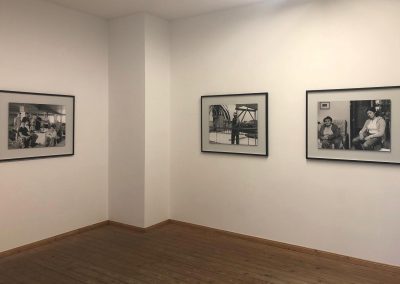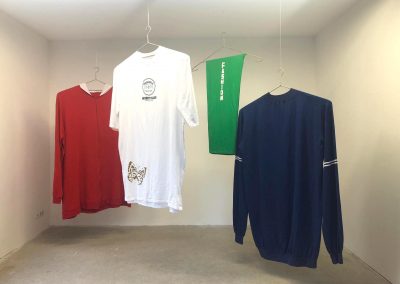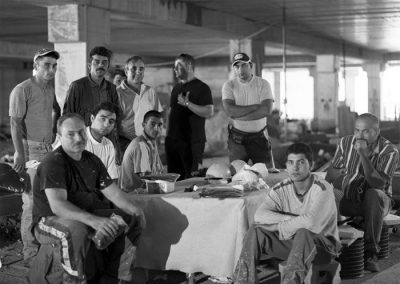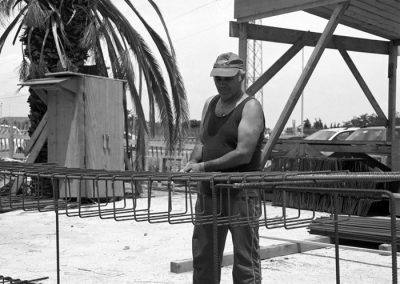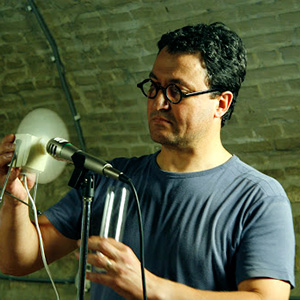
About Matei Bajenaru
Matei Bejenaru is a visual artist who lives and works in Iaşi, where he teaches photography and video art at the “George Enescu” University of Arts. In his projects, through photography, video, performance and inter-media installations, he analyzes how the ways of economic production, technological knowledge, mentalities and lifestyles have changed in the last two decades in the post-communist countries. The Romanian workers’ immigration towards the West was analyzed in his artistic projects Travel Guide and Maersk Dubai, selected for various international exhibitions, like the ones in Tate Modern, Level 2 Gallery in London in 2007, The Taipei Biennial in 2008.
His choral music experimental project, started in 2010, Songs for a Better Future, was presented at The Drawing Room and Tate Modern in London, Western Front la Vancouver, Kuenstlerhaus Buchsenhausen Innsbruck, Laakteater Haga. The most recent episode of this project, Ode of the Matter, was exhibited at The National Museum of Contemporary Museum in Bucharest and at the Art Encounters Biennial in Timişoara
Read more: https://ancapoterasu.com/matei-bejenaru/matei-bejenaru-cv
Bejenaru Matei /Same Histories, Spinnerei Leipzig at Anca Poterasu Gallery, 2019
Matei Bejenaru’s artistic approach involves an in-depth questioning of social values and shifting paradigms in systems of economic production, mentalities and lifestyles. Working with photography, but also video, performance and installations the artist is preoccupied with the ethic of representation in his numerous documentary projects alongside a continuous interest on how the photographical images are formed and how they inform our world.
The solo-show Same Histories features two series of Matei Bejenaru’s works, spanning over a time period of five years during which Romania became a part of the European Union in 2007. The installation work Enlarged Clothing (2005) and the selection of photographs from the M3: Work, Memory, Movement (2008 – 2010) continue to map out a recognizable story to recent international debates on work migration and the exploitation of cheap labour.
In 2003, Romania was the leading European exporter of textiles to the EU market, with most of the clothing production taking place under the ”Lohn system”, which took advantage of the low labour force costs and the remaining industrial infrastructure of the former communist regime. With Romania entering the European Union in 2007, the Lohn system of production continued to extend to other, more cost-effective areas in Europe regarding the labour force, to countries such as Ukraine or Republic of Moldova. Through the Clothes Enlargement art project, Matei Bejenaru devised an algorithm which shows how large the clothes should have been in rapport with more equitable pay at the time.
In search for better work conditions, better salaries and opportunities, many workers from Eastern European left their countries to work abroad. Matei Bejenaru’s photographical works frtom the M3 series have a well-defined documentary value, but they also explore types of representation of labour, avoiding the propagandistic approach exercised during the communist regime in Romania, for example. The works reveal the pitfalls in understanding labour in the past and its ongoing consequences now. By tracing nowadays living conditions and work environments Matei Bejenaru draws attention over the way that history keeps either repeating or continuously creating the same instances, in need of a lucid contextualization amidst formal movements and migration processes.
The cultural project “Same Histories” is co-financed by the National Cultural Fund Administration (AFCN). It does not necessarily represent the position of AFCN. The AFCN is not responsible for the content of the project or the manner in which the results of the project may be used. These are entirely the responsibility of the funding recipient.
ARAC is a non-profit organization founded in June 2012, in order to produce and promote contemporary art in Romania and abroad. The initiative of the 58 Plantelor Residency belongs to Anca Poterasu, gallerist and ARAC President. The first edition of the Residency took place in 2015 and it was financed through a grant offered by Norway, Iceland, Liechtenstein and the Romanian Government.

